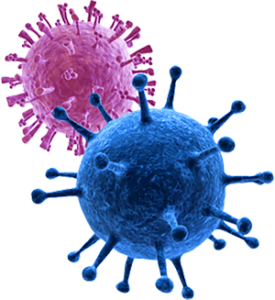
Bacteria:
Bacteria can be found everywhere – soil, plants, water, animals, etc. It’s important to remember that bacteria have been around since the beginning of life on earth – some scientists have said that without bacteria, we may not have existed! Bacteria can be both beneficial and detrimental to human health. Bottom line – we need bacteria to survive. Commensal bacteria, such as probiotics are an example of healthy bacteria found in your gut. It’s crucial for the breakdown of certain types of nutrients, such as complex sugars, into the forms the body can use. Friendly bacteria help protect us from dangerous ones by occupying places in the body the pathogenic (disease causing) bacteria want to attach to. In some cases, when pathogens enter the body, friendly bacteria actually come to the rescue and attack the pathogens. Some of the deadliest diseases and devastating epidemics in human history have been caused by bacteria. Examples: Cholera, Dysentery, Pneumonia, etc.
Ways to keep germs away:
- Wash your hands before eating, touching your eyes, mouth, or nose
- Don’t share things such as towels, napkins, lipstick, mascara or anything else that might be contaminated
- Take a daily probiotic
Virus:
A virus is a nonliving microorganism that replicates itself within the host’s cells. There is nothing about a virus that is beneficial to the body. When a virus comes in contact with any living organism it thrives throughout the host’s body. Viruses tend to lie around the surface of a living organism and when it gets the chance, it enters through the mouth, nose, eyes or ears. It latches itself onto the host and invades the cells causing disease, acting like a parasite. Here are some examples of various types of viruses: influenza, Human papillomavirus (HPV), HIV/AIDS, the common cold, hepatitis, herpes, rotavirus, chickenpox, encephalitis (inflammation of the brain), chlamydia, rickettsia.
Boosting your immune system can help prevent you from getting viruses such as the flu or common cold. Your lifestyle is one of the most important ways to stay healthy.
Ways to boost your immune health and stay flu-free:
- Vitamin D – Get some sunshine and take a vitamin D supplement.
- Exercise – Get your body moving!
- Avoid sugar and fructose.
- Learn how to cope with stress – Stress has a major impact on your immune system.
- Get enough sleep – Let your body rest and repair.
Source
http://www.diffen.com/difference/Bacteria_vs_Virus
The information provided is for general interest only and should not be misconstrued as a diagnosis, prognosis or treatment recommendation. This information does not in any way constitute the practice of medicine, or any other health care profession. Readers are directed to consult their health care provider regarding their specific health situation. Marque Medical is not liable for any action taken by a reader based upon this information.

